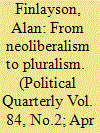| Srl | Item |
| 1 |
ID:
122482


|
|
|
|
|
| Publication |
2013.
|
| Summary/Abstract |
This essay puts into context the debate between Michael Jacobs and Ian Mulheirn, exploring the theories and themes underpinning their arguments, published in issue 84 1 of the Political Quarterly. It discusses, firstly, the roots of Mulheirn's approach in European neoliberalism and, secondly, the roots of Jacobs' approach in a range of sources currently contending for authority over debates within the Labour party. These include themes drawn, broadly, from Polanyi, Keynes, Schumpeter and Schumacher. In a conclusion the article makes the case for a 'pluralistic' to the organisation of political and economic power in the UK.
|
|
|
|
|
|
|
|
|
|
|
|
|
|
|
|
| 2 |
ID:
136151


|
|
|
|
|
| Summary/Abstract |
Expressions of disaffection with politics are often connected with criticism of the ways in which contemporary politicians speak and communicate. In this article I show how political speech is in part a product of the way in which a society organises and arranges communication institutionally, technologically and aesthetically. The art of rhetoric is most fundamentally concerned with how, in the midst of political dispute and contestation, political arguments may be made persuasive through their connection with the ‘common sense’ of audiences. This process enables a people to reflect on its beliefs and values and to assess their adequacy in particular circumstances. Decline in this art may be attributed to social and technological change but also, and above all, to the dominance of ideologies hostile to the concepts of ‘common sense’ and ‘common good’, and which privilege the arts of behaviour change and choice management over those of argument, debate and persuasion.
|
|
|
|
|
|
|
|
|
|
|
|
|
|
|
|